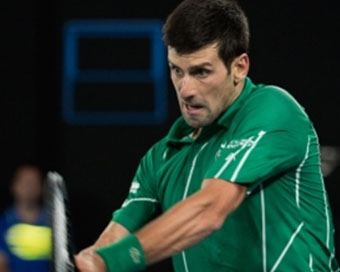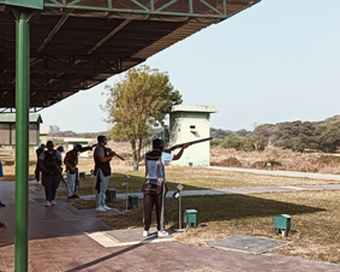Gallery
 PM Modi visit USA
PM Modi visit USA Only the mirror in my washroom and phone gallery see the crazy me : Sara Khan
Only the mirror in my washroom and phone gallery see the crazy me : Sara Khan Karnataka rain fury: Photos of flooded streets, uprooted trees
Karnataka rain fury: Photos of flooded streets, uprooted trees Cannes 2022: Deepika Padukone stuns at the French Riviera in Sabyasachi outfit
Cannes 2022: Deepika Padukone stuns at the French Riviera in Sabyasachi outfit Ranbir Kapoor And Alia Bhatt's Wedding Pics - Sealed With A Kiss
Ranbir Kapoor And Alia Bhatt's Wedding Pics - Sealed With A Kiss Oscars 2022: Every Academy Award Winner
Oscars 2022: Every Academy Award Winner Shane Warne (1969-2022): Australian cricket legend's life in pictures
Shane Warne (1969-2022): Australian cricket legend's life in pictures Photos: What Russia's invasion of Ukraine looks like on the ground
Photos: What Russia's invasion of Ukraine looks like on the ground Lata Mangeshkar (1929-2022): A pictorial tribute to the 'Nightingale of India'
Lata Mangeshkar (1929-2022): A pictorial tribute to the 'Nightingale of India' PM Modi unveils 216-feet tall Statue of Equality in Hyderabad (PHOTOS)
PM Modi unveils 216-feet tall Statue of Equality in Hyderabad (PHOTOS)India Open Competition in Shotgun, organised by the National Rifle Association of India (N
- Hockey India names Amir Ali-led 20-man team for Junior Asia Cup
- Harmanpreet Singh named FIH Player of the Year, PR Sreejesh gets best goalkeeper award
- World Boxing medallist Gaurav Bidhuri to flag off 'Delhi Against Drugs' movement on Nov 17
- U23 World Wrestling Championship: Chirag Chikkara wins gold as India end campaign with nine medals
- FIFA president Infantino confirms at least 9 African teams for the 2026 World Cup
All eyes on Australian Open as players exit quarantine Last Updated : 30 Jan 2021 01:31:40 PM IST 
The first group of tennis players arriving in Australia for the upcoming Australian Open was released from hotel quarantine, giving a fresh glimmer of hope for a smooth start to the tournament. While Australia has so far demonstrated success in managing the pandemic, a large number of players entering from Europe and North America which have had a higher incidence of Covid-19, came as a potential threat to the country's pandemic control, particularly with two confirmed cases at the event qualifiers in Doha.
Adding to domestic stress over the decision to go ahead with the event were a large number of Australians who remained stranded overseas, unable to return home due to the government's international arrival cap and shortage of flight options.Lecturer on sport and Australian studies in the Monash Intercultural Lab at Monash University, Dr. Tom Heenan told Xinhua that considering the strict hard lockdown Melbourne endured across several months in the later half of 2020, and the large number of people arriving for the Australian Open, it was understandable that local government and residents were concerned."Melbourne has been the worst affected area in Australia so there's a certain degree of nervousness with the government. And with the new strains, I think the risk certainly is exacerbated," Heenan said.Authorities in Melbourne pledged the tightest quarantine arrangements in the world at a tennis tournament for the 1,200 tennis players, officials, and support staff as they arrived in Melbourne from January 15.During the 14 days of hotel quarantine, nine persons including two players tested positive, three of which were infected with the more contagious and deadly mutant strain of virus found in Britain. 72 players were deemed close contacts and confined to their own hotel rooms without access to gyms and courts, which became a much-discussed episode in the lead up to the tournament.Naturally, the Australian Open is not the only major sporting event to be knocked sideways by the pandemic. The cancellation of Australia's F1 Grand Prix and Wimbledon tennis grand slam, on top of the postponement of the Tokyo Olympics in 2020, shows how great the impact can be, especially on those events with high numbers of intermingling players and spectators.University of Queensland epidemiologist Linda Selvey told Xinhua the biggest risk at sporting events is not necessarily the on-field play, but what the players do when they're not on the field, such as attending restaurants, entertainment, or even in their hotels."There is also a risk of transmitting Covid-19 between spectators as they coalesce from a lot of different areas to watch the game, often calling out, singing, and shouting, which we know are important ways of transmitting the virus," Selvey said.Nevertheless, the price of giving up is huge. According to a Nielsen Sports report cited by local media, the Australian Open brought 387 million Australian dollars (about $295.82 million) into the Victorian economy in 2020. Victorian Premier Daniel Andrews claimed the state was likely to have lost the tournament if it didn't go ahead in 2021, the Age reported.For the players, an opportunity for high-level competition, especially with a total prize pool of 71.5 million Australian dollars (about $54.65 million) is also important."It's insane and super intense but it's super good, because, after that, you can have a new normal like what we were used to last year this time in the United States," said seven-time Australian Open singles champion Serena Williams from her Adelaide hotel room on the US TV program The Late Show With Stephen Colbert.The Australian Open has revamped the match schedule in the lead-in week to give the over 70 players in hard hotel lockdown the best possible preparation and training opportunities, adding a WTA 500 event for quarantined players and pushing back the ATP 250 event and the ATP Cup for 24 hours.For the general community, analysts also affirmed the positive role played by big sports events, especially in times of pandemic."In Melbourne, these events are central not just to the economy, but to the morale of the city, particularly as you've had a whole year in which Melbourne was in lockdown for long periods, and a whole year in which this city essentially was without spectator sport," Heenan explained."Melbourne is meant to be the sporting capital of Australia. It hasn't had a real sporting event since probably last March. So I think the city actually needs this not just as a morale boost, but for Melbourne to promote itself again as the sporting capital. So I think there's a certain degree that this has to go ahead."IANS Sydney For Latest Updates Please-
Join us on
Follow us on








172.31.16.186







